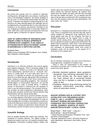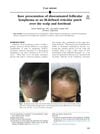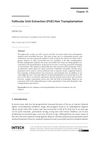 3 citations,
April 2016 in “PubMed”
3 citations,
April 2016 in “PubMed” Using Minoxidil 5% foam with a botanical hair solution twice daily can significantly improve hair growth and appearance in men with hair loss, and is generally well-tolerated.
 2 citations,
January 2023 in “Research Square (Research Square)”
2 citations,
January 2023 in “Research Square (Research Square)” Managing emotional distress, obesity, insulin resistance, and high male hormones is crucial for improving well-being in women with PCOS.
 2 citations,
May 2021 in “bioRxiv (Cold Spring Harbor Laboratory)”
2 citations,
May 2021 in “bioRxiv (Cold Spring Harbor Laboratory)” A special foam called EG7 PTK-UR helps heal skin wounds better than other similar materials, working as well as a top-rated product and better than a polyester foam.
 2 citations,
November 2011 in “Journal of Infection”
2 citations,
November 2011 in “Journal of Infection” A woman with asthma improved from a severe fungal infection after treatment change, and most HIV-positive women in a UK study had low immune cell counts but were responding well to treatment.
 2 citations,
July 2009 in “Pharmacognosy Research”
2 citations,
July 2009 in “Pharmacognosy Research” A herbal mix with chickpea, holy basil, and nut grass extracts grew rat hair well, similar to a common hair growth drug.
1 citations,
December 2019 in “Canadian journal of ophthalmology” A girl with type 1 diabetes developed a serious eye condition very early, suggesting the need for earlier eye checks and that early treatment can work well.
 1 citations,
April 2019 in “JAAD case reports”
1 citations,
April 2019 in “JAAD case reports” A woman with lymphoma had a rare skin rash on her scalp and forehead, which was hard to diagnose but responded well to treatment.
 1 citations,
January 2013 in “International Journal of Trichology”
1 citations,
January 2013 in “International Journal of Trichology” The conference discussed various hair disorders and treatments, including the use of topical steroids, high doses of cetrizine, and hair grafting, as well as the psychological impact of hair loss.
 April 2024 in “The Egyptian Journal of Hospital Medicine ”
April 2024 in “The Egyptian Journal of Hospital Medicine ” Current treatments for androgenetic alopecia manage symptoms but don't cure it, and it affects social and psychological well-being.
 January 2024 in “Deleted Journal”
January 2024 in “Deleted Journal” Essential oils like lavender, chamomile, and bergamot help manage stress and improve well-being.
 November 2023 in “International Journal of Dermatology”
November 2023 in “International Journal of Dermatology” Patients with central centrifugal cicatricial alopecia often have higher rates of metabolic, autoimmune, and atopic conditions, as well as anxiety and depression.
 November 2023 in “Dermatology and Therapy”
November 2023 in “Dermatology and Therapy” Baricitinib treatment helps regrow eyebrow, eyelash, and scalp hair in severe alopecia areata, improving patients' emotional well-being and quality of life.
 September 2023 in “Skin appendage disorders”
September 2023 in “Skin appendage disorders” Trichoscopy, a method of examining hair, can objectively measure how well botulinum toxin works for hair loss treatment.
 August 2023 in “Journal of Student Research”
August 2023 in “Journal of Student Research” The document concludes that alopecia is an incurable autoimmune disease with various treatments and that diet, as well as COVID-19, may impact it.
 June 2023 in “World Journal of Biology Pharmacy and Health Sciences”
June 2023 in “World Journal of Biology Pharmacy and Health Sciences” Acne is a common skin condition treated with creams, antibiotics, and emerging therapies, and it can significantly affect mental well-being.
 June 2023 in “Skin Research and Technology”
June 2023 in “Skin Research and Technology” The supplement with amino acids, iron, selenium, and marine hydrolyzed collagen improved hair growth more than drug treatment alone, with most people tolerating it well.
 May 2023 in “Aesthetic Plastic Surgery”
May 2023 in “Aesthetic Plastic Surgery” The document concludes that there are various surgical techniques for hair restoration, their success depends on the surgeon's skill, patient's health, and quality of donor hair, and they can potentially improve the mental well-being of those with hair loss.
 May 2023 in “Vestnik dermatologii i venerologii”
May 2023 in “Vestnik dermatologii i venerologii” Early-stage male pattern baldness shows two types of hair loss: one on the top of the head linked to hormonal changes, and another at the back of the head. The top hair loss responds well to specific treatment, while the back hair loss does not.

Hair loss treatment using stem cells from baby teeth was effective for 75% of men tested, with mild side effects. A scoring system may predict how well this treatment works.

Low Vitamin D, Vitamin B12, and iron levels, as well as thyroid issues, are strongly linked to premature greying of hair, which also negatively affects quality of life.
 January 2023 in “Nanomedicine & nanotechnology open access”
January 2023 in “Nanomedicine & nanotechnology open access” Microneedling is a promising, simple, and cost-effective treatment for hair loss that works well with other therapies.
 December 2022 in “Journal of Education, Health and Sport”
December 2022 in “Journal of Education, Health and Sport” Covid-19 can cause different types of hair loss, which can affect people's mental and social well-being.
 November 2022 in “Journal of Investigative Dermatology”
November 2022 in “Journal of Investigative Dermatology” 3D skin bioprinting, using skin bioinks like collagen and gelatin, is growing fast and could help treat wounds, burns, and skin cancers, as well as test cosmetics and drugs.
 March 2021 in “The British Journal of Psychiatry”
March 2021 in “The British Journal of Psychiatry” Countries with stricter cultures had fewer COVID-19 cases and deaths, paranoia is linked to false memories, psychosocial intervention works as well with or without antipsychotic drugs for young people with psychosis, smartphones can detect changes in behavior indicating illness relapse, and recruitment agents show regional and gender biases.
July 2020 in “International journal of clinical & experimental dermatology” Hair loss in women aged 20-30 is often linked to deficiencies in Vitamin D, zinc, ferritin, and haemoglobin, as well as low SHBG levels in those with irregular periods.
 May 2019 in “Paediatrics and child health”
May 2019 in “Paediatrics and child health” The document concludes that personalized treatment, including lifestyle changes and medication, is essential for managing PCOS in teenagers, while also addressing their psychological well-being.
 October 2018 in “Journal of Clinical Research in Pediatric Endocrinology”
October 2018 in “Journal of Clinical Research in Pediatric Endocrinology” Children with classic congenital adrenal hyperplasia have thicker heart fat and more heart and blood vessel risk factors, especially if their condition is not well-controlled.
 May 2017 in “InTech eBooks”
May 2017 in “InTech eBooks” Follicular Unit Extraction (FUE) is a popular hair transplant method with minimal scarring that can transplant many grafts quickly and improve appearance and psychological well-being.
 May 2017 in “InTech eBooks”
May 2017 in “InTech eBooks” Some hair loss disorders cause permanent loss due to scarring, and treatments like steroids don't always work well.
 September 2016 in “Más dermatología”
September 2016 in “Más dermatología” New factors in female hair loss include genetics, hormones, stress, and inflammation; future treatments should also focus on these areas and consider the patient's emotional well-being.



























